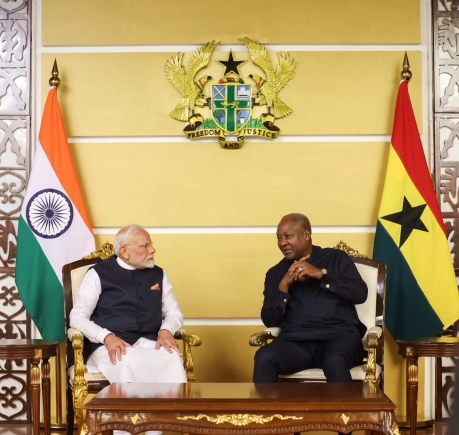On July 2, 2025, Indian Prime Minister Narendra Modi made a historic visit to Ghana, marking the first time an Indian prime minister set foot in the West African nation in over three decades. This landmark trip, part of a broader five-nation tour, underscores India’s ambition to deepen ties with the Global South amid a rapidly shifting global economic and geopolitical landscape. Against the backdrop of America’s evolving foreign policy and India’s emergence as a global economic power, this visit signals a renewed commitment to economic, security, and cultural collaboration between India and Ghana, with significant implications for both nations and the broader African continent.
A new chapter in India-Ghana relations
The visit, hosted by Ghanaian President John Dramani Mahama, elevated bilateral ties to a “Comprehensive Partnership,” reflecting shared democratic values and a mutual vision for sustainable development. The two leaders set an ambitious target to double their bilateral trade from $3 billion to $6 billion within five years, leveraging India’s expertise in fintech, pharmaceuticals, and infrastructure to support Ghana’s economic restructuring under an International Monetary Fund (IMF) program. Indian companies, already significant players in Ghana with $2 billion invested across 900 projects, pledged further support for critical sectors like mining, agriculture, and digital infrastructure.
For Ghana, a resource-rich nation navigating economic recovery and seeking to diversify its economy, India’s commitment offers a lifeline. President Mahama emphasized leveraging India’s technological prowess to bolster Ghana’s aspirations to become a regional food basket and a vaccine manufacturing hub. The signing of four Memoranda of Understanding (MoUs) in areas such as cultural exchange, traditional medicine, standardization, and institutional dialogue further cements this partnership, fostering collaboration in health, education, and technology.
Global Economic Context: India as an emerging power
India’s outreach to Ghana comes at a time when the global economic order is undergoing profound changes. With a projected growth trajectory to become the world’s third-largest economy, India is positioning itself as a counterweight to traditional powers like the United States and emerging rivals like China. The United States, under its current foreign policy, has prioritized strategic competition with China and Russia, often focusing on security alliances in the Indo-Pacific and Europe. This has left room for India to carve out a leadership role in the Global South, emphasizing south-south cooperation rooted in shared histories of colonial struggle and non-alignment.
Ghana, a beacon of democratic stability in West Africa, serves as a strategic gateway for India’s broader African ambitions. Unlike China’s resource-heavy investments, which have drawn criticism for debt burdens and environmental concerns, India’s approach focuses on capacity building, technology transfer, and sustainable development. Modi’s visit, timed just before the BRICS Summit in Brazil, underscores India’s intent to challenge perceptions of being a “perennial underdog” in Africa, where China’s infrastructure financing and media presence have historically dominated.
Implications for India and Ghana
For India, the visit reinforces its soft power and economic influence in Africa. By sharing its Unified Payments Interface (UPI) expertise, India aims to enhance Ghana’s financial inclusion, potentially transforming its digital economy. The focus on critical minerals aligns with India’s strategic needs for resources like lithium and cobalt, essential for its green energy transition. Additionally, Modi’s pledge to double scholarships under the Indian Technical and Economic Cooperation (ITEC) and Indian Council for Cultural Relations (ICCR) programs strengthens people-to-people ties, particularly with Ghana’s 15,000-strong Indian diaspora, which plays a vital role in commerce, healthcare, and education.
For Ghana, the partnership offers economic diversification and resilience. Indian investments in agro-processing, pharmaceuticals, and renewable energy align with Mahama’s priorities of youth employment and food security. The collaboration in defense, including training for armed forces and cybersecurity, addresses regional security challenges, particularly jihadist threats in the Sahel. Ghana’s role as a vaccine hub could also elevate its status in global health, supported by India’s pharmaceutical expertise.
Consequences and geopolitical dynamics
The visit carries broader consequences for global geopolitics. India’s push for a “Comprehensive Partnership” with Ghana signals a shift from transactional trade to strategic collaboration, challenging China’s dominance in African markets. By advocating for reforms in global governance and Africa’s inclusion in platforms like the G20, evidenced by the African Union’s permanent membership under India’s G20 presidency, Modi positions India as a champion of the Global South. This contrasts with America’s more selective engagement in Africa, often centered on countering Chinese influence rather than broad-based development.
However, challenges remain. India’s investments, while significant at $2 billion, pale in comparison to China’s multibillion-dollar infrastructure projects. Ghana must navigate this complex geopolitical space, balancing partnerships with India, China, and Western nations while addressing domestic concerns like debt restructuring. Additionally, India’s limited media presence and diplomatic capacity in Africa could hinder its ability to sustain momentum post-visit.
Investment commitments
While no new investment figures were explicitly announced during the visit, Indian companies have already invested $2 billion in Ghana across 900 projects, with a commitment to further support in critical minerals, fintech, and agriculture. India’s concessional financing, including lines of credit and grants worth nearly $450 million, has supported infrastructure projects like the Jubilee House and Komenda Sugar Factory. The pledge to double trade to $6 billion by 2030 suggests additional investments in manufacturing, pharmaceuticals, and digital infrastructure, though specific amounts remain undisclosed.
Conclusion
Prime Minister Modi’s visit to Ghana marks a pivotal moment in India-Ghana relations, reflecting India’s strategic pivot toward Africa amid a shifting global economic order. For Ghana, the partnership promises economic diversification and security cooperation, while for India, it strengthens its role as a leader in the Global South. As both nations navigate a world shaped by competing powers and economic uncertainties, their “Comprehensive Partnership” offers a model of south-south cooperation that prioritizes mutual growth over exploitation. With America’s focus elsewhere, India’s engagement with Ghana could redefine the contours of influence in Africa, provided both nations sustain their ambitious commitments.


